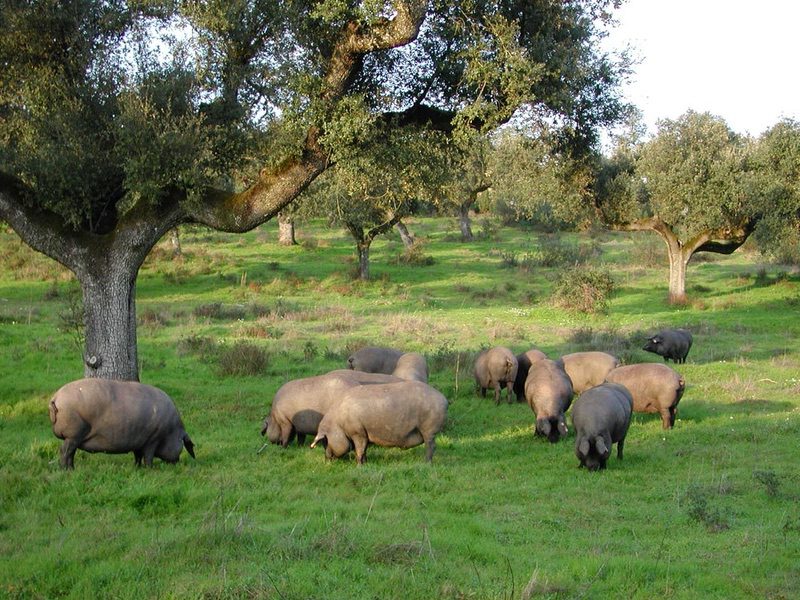A Journey Through Portugal’s Culinary Heritage
Some travel experiences demand more than a quick visit or a snapshot for social media. They require immersion—standing in the landscape, feeling the history, tasting the legacy. The Black Alentejano pig, a living testament to Portugal’s deep-rooted agricultural traditions, is not just an animal; it’s a story of sustainability, terroir, and culinary artistry that dates back centuries.
To truly understand this remarkable breed, one must travel to the rolling plains of the Alentejo region, where these pigs roam freely, feasting on acorns beneath sprawling cork and holm oak forests. The journey from breeding to processing and finally savoring the meat is a fascinating one—equal parts tradition, science, and culture. This is a story of people and place, of a breed shaped by its environment, and of a culinary tradition that continues to define Portugal’s identity on the global stage.
A Breed Rooted in History
The Black Alentejano pig, or Porco Preto, is a direct descendant of the ancient Iberian pigs that once roamed the Iberian Peninsula. While Spain’s Iberian pig is widely known for producing world-famous jamón ibérico, Portugal’s Alentejano variant offers its own equally exceptional qualities. It’s a breed that has thrived for generations, perfectly adapted to its environment, producing some of the most sought-after pork in the world.
Unlike industrially farmed pigs, the Alentejano breed is raised in a montado system, a traditional agro-sylvopastoral landscape unique to Portugal. Here, the pigs live in a semi-wild state, foraging beneath cork oak and holm oak trees. Their diet of acorns (rich in oleic acid) is what gives the meat its unparalleled marbling, depth of flavor, and melt-in-your-mouth texture. This method of free-range, acorn-fed farming isn’t just about flavor—it’s about preserving an ancient way of life and maintaining a delicate ecosystem.
For travelers, venturing into the montado means stepping into a world where time slows down, where farming is still done with respect for the land, and where generations of farmers take pride in their role as stewards of tradition.
Breeding and Raising: A Lesson in Sustainability
Raising black Alentejano pigs is both an art and a science. Unlike commercial pig farming, which prioritizes rapid growth and mass production, Alentejano pigs are bred with patience. From birth, the pigs spend months in pastures, moving through different phases of growth before reaching their peak weight and flavor potential.
The most crucial stage of their development is the montanheira phase—the period from October to March when pigs feast almost exclusively on acorns. This is where the magic happens. The acorn-rich diet imbues the pork with healthy fats and a distinctive, nutty sweetness that cannot be replicated in any other environment. It’s a slow, natural process that respects both the animals and the land.
For those seeking an immersive travel experience, many farms in Alentejo welcome visitors, offering a behind-the-scenes look at the life cycle of these remarkable animals. Walking through the pastures, watching the pigs forage, and speaking with the farmers who have dedicated their lives to this tradition is an education in sustainability at its finest.
From Pasture to Plate: The Craft of Processing Alentejano Pork
The processing of Black Alentejano pork is a meticulous craft honed over centuries. The most prized product from these pigs is presunto Alentejano, Portugal’s answer to Spain’s jamón ibérico. The curing process can take up to 36 months, allowing time for the meat to develop its signature complexity.
But the magic of this breed extends far beyond presunto. The versatility of Alentejano pork is unmatched—each cut offering something unique.
- Secreto – A hidden cut buried within the fat layers, incredibly tender and rich in flavor, best grilled simply over an open flame.
- Pluma – A feather-shaped cut known for its perfect balance of fat and lean meat, often served seared to perfection.
- Lombo – The loin, a lean yet flavorful cut often used in traditional Portuguese dishes.
- Chouriço and Linguiça – Traditional smoked sausages made from the richly marbled meat, spiced and cured to perfection.
Cooking with Black Alentejano pork is an experience in itself. Whether slow-roasted, grilled over open flames, or dry-aged for charcuterie, the meat is deeply flavorful with a buttery texture. It’s not just a meal—it’s a celebration of terroir, tradition, and craftsmanship.
A Culinary Pilgrimage: Experiencing Alentejano Pork in Portugal
For travelers who seek experiences beyond the ordinary, a culinary journey through Alentejo is essential. This isn’t just about eating good food; it’s about understanding the cultural and environmental forces that shape it.
Some of the best ways to experience Black Alentejano pork in Portugal include:
- Farm Tours & Tastings – Many small farms offer immersive experiences where visitors can learn about breeding, raising, and curing, followed by guided tastings of presunto, chouriço, and fresh cuts.
- Alentejo’s Michelin-Starred Restaurants – Many top chefs are showcasing Alentejano pork in innovative ways, blending tradition with modern culinary artistry.
- Rustic Tasquinhas & Local Taverns – Small village restaurants serve traditional dishes where the focus is on simplicity and quality, often paired with local wines from the Alentejo region.
Beyond the dining table, traveling through Alentejo offers a deeper appreciation for Portugal’s rural landscapes, with rolling vineyards, historic whitewashed villages, and centuries-old cork forests forming the backdrop of this extraordinary region.
Why This Matters: The Bigger Picture of Sustainable Eating
The story of the Black Alentejano pig is more than a food journey—it’s a lesson in sustainability, biodiversity, and cultural preservation. In a world where industrial farming dominates, the Alentejano way of raising pigs stands as a model of ethical and ecological balance.
By choosing to explore, understand, and support these traditional farming methods, we become part of a larger movement that values quality over quantity, flavor over convenience, and sustainability over mass production. It’s about traveling with purpose—seeking out the artisans, farmers, and chefs who are keeping these traditions alive.
Final Thoughts: The Journey is the Reward
Travel is about connection. It’s about going beyond the tourist hotspots and finding the soul of a place through its people, its landscapes, and its food. The Black Alentejano pig is more than just a breed—it’s a bridge to understanding Portugal’s heritage, a reminder that food is not just something we consume, but something that tells a story.
For those who crave travel experiences that are immersive, hands-on, and deeply rooted in culture, the journey through Alentejo is one worth taking. Whether you find yourself standing under the shade of an ancient cork oak, watching pigs forage in golden fields, or sitting at a rustic table with a plate of expertly cured presunto, the story of the Black Alentejano pig becomes part of your own journey.
And that, after all, is what true exploration is about.
Ready for an adventure that feeds both your curiosity and your appetite? Portugal is calling. Let’s explore.

Robert Riesmeyer is the visionary Founder and Experience Curator of Epic Explorations, a boutique travel company dedicated to crafting extraordinary journeys worldwide. Rooted in a passion for exploration, Robert brings a unique blend of creativity and commitment to every adventure, ensuring each experience is as unforgettable as the destinations themselves.
Originally from the Midwest, Robert left behind a career in insurance to pursue his dream of sharing the world's wonders with fellow travelers. With a focus on safety and an eye for the unexpected, he curates immersive experiences that allow travelers to connect deeply with the world, fostering curiosity, connection, and unforgettable memories.
Beyond his role in travel, Robert embraces the spirit of giving through his portrayal of Santa Claus, spreading joy to families and children during the holiday season. Through this role and Epic Explorations, he supports numerous charities, including Shadow Buddies, Mother's Refuge, Moving Ahead, Opertion Breakthrough and Santa America, bringing kindness and hope to those in need.
Based in Kansas City, Robert is constantly in search of new frontiers, dreaming big, giving back, and inspiring others to explore even bigger.


